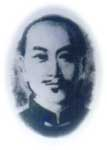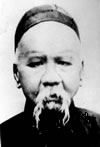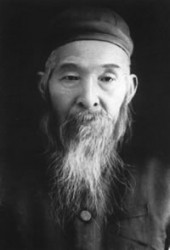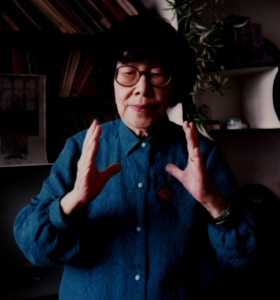Li Yi Yu (1832–1892) was a nephew (sisters son) and foremost student to the Wu style founder Wu Yu Xiang. The following is a translation from Chinese of the version of “Five character poem” that Sun Lu Tang published in his book ”A study of Tai Ji Quan”. When the book was published it was the first time the poem reached a wider audience. Sun Lu Tang studied with Li Yi Yu’s foremost student, Hao Wei Zhen (1849–1920) and was given this poem by him. I (Per Nyfelt) studied with the daughter of Sun Lu Tang, Sun Jian Yun, between 1992 and 2003 (of which 3 years I was living in China). My translation is based on her explanations of the meaning of the text. The handwritten material of Li Yi Yu was published some years ago. I have compared the hand written version with the published one and found the text to be almost identical to the version in Sun Lu Tangs book with no difference in meaning. Li Yi Yu says the following about his poem in the handwritten text:
In the fiftieth year of the cycle during the reign of Emperor Xianfeng [i.e. 1853], when I was just over twenty years old, I started to learn this skill from my uncle [Wu Yu Xiang], who spared no effort in instructing me. Alas, I am really stupid, and after more than twenty years I have only obtained a superficial level. Yet I can see what is exquisite in it, and so I have written a piece which follows, called the “Five-Word Formula”, to remind myself what I have learned.
 |
 |
 |
 |
|
Li Yi Yu |
Hao Wei Zhen |
Sun Lu Tang |
Sun Jian Yun |
Still heart
When the heart is not still the mind (intention) lacks focus. When you then lift your hand there is no direction in any way, for this reason, the heart must be still.
The moment when you move is not decided by oneself.
The heart is still and you understand with your body.
The movements follow the opponent. Let the bent be followed by the extended. Don’t drop but don’t resist either. Bending and extending is not up to myself. If the opponent have force, I have force too but my force precedes.
If the opponent does not have force, I still have force by my intention (mind) precedes.
Pay close attention, your attention is where there is contact. By neither disconnecting or resisting it becomes possible to find the information. After having practised for some time, the body will be able to use this information.
This depends entirely on using intention and not on power. Eventually, the opponent will be controlled by me and I will not be controlled by others.
Agile body
When the body is stagnant one cannot move freely, therefore the body must be agile. When lifting the hand it must not be done insipidly.
When the opponents force has reached the hair of my skin, my mind has already reached his bones.
Both hands upholds the opponent and Qi penetrates throughout.
When the left is heavy it empties and the right moves (strikes); when the right is heavy it empties and the left moves (strikes).
Qi is like a wheel, the whole body follows in a coordinated way. When something is not following in a coordinated way, the body becomes scattered and powerless; the fault is then to be found in legs and waist.
First from the heart to the body1, you follow others and not yourself. Later the body follows2 the heart but still you follow others. To follow yourself is stagnant but to follow others is alive. When you can follow others you can discern with your hands. Then you can measure the size of the opponents power and distance with hair breadth precision. Forward and backward is then always in exact harmony.
The longer you practise the more skill you will get [if you adhere to the above].
Gathered Qi
When Qi is scattered there is no subtlety and the body is in disorder, gather the Qi in your spine instead.
Breathing is smooth and fills the entire body indiscriminately. Inhaling gathers and builds up, exhaling opens and expresses. Inhaling lifts naturally and holds the opponent while exhaling sinks down and is used to send the opponent away.
This is done by moving Qi through the intent, not by moving Qi through force.
Complete power
Successful practise means that body and power has been united.
Clearly discern empty and full.
In order to express power one need root. The force comes from the heel, is governed by the waist, manifested as movement in the fingers and is expressed through the back.
One must be alert so one finds the moment when the opponent is about to express force, but has not yet done so, so that my force can already meet the opponents – neither to early nor to late. As if the skin was on fire, like a fountain gushing forth.
Seek the straight in the bent, store and then issue power.
The direction is obtained by following the hands.
This is to borrow force in order to strike and also to use four ounces to deflect a thousand pounds.
Gathered spirit
Once you are sufficiently proficient in all four (above) then return to gathering the spirit.
When the spirit is gathered the Qi will be stimulated and forged. By training the Qi you return to the spirit.
Qi is active and expansive3.
When the spirit is focused, opening and closing is precise and empty and full clearly discerned.
When left is empty right is full; if right is empty left is full. Empty is not completely without power as Qi is moving powerfully. Full does not mean completely tight, the spirit must be carefully gathered.
The important places are in the middle of the chest and waist, its movement and use is not external.
Force is borrowed by others, qi is expressed through the spine. How can Qi be expressed through the spine? Qi sinks from the shoulders and gathers in the spine and concentrates in the waist. This is Qi from above and is called closing.
From the waist Qi moves upwards through the back and out in the arms and then manifested in the fingers. This is Qi from down to up and is called opening.
To close is to gather and to open is to release.
Once you understand opening and closing, you understand yin and yang.
When you have reached this level, your skill will continually develop until you can do as you please.
1i.e. you use the mind to command the body what to do.
2i.e. follows naturally and spontaneouly by itself – no separation of “first this, then that” just moving as one.
3Very multifacted phrase: 气势腾挪. Qi Shi is also posture, air, charisma. Teng nuo is also manouvering and agile.